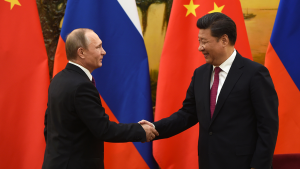Russia, China, and the Battle for Global Dominance
About This Event
Russia’s invasion of Ukraine and China’s economic and military rise signify the emergence of a new geopolitical order. In this era of revived great power competition, the United States faces adversaries increasingly willing and able to challenge its global interests and project their own influence. Experts from the United States, Asia, and Europe consider what the war in Ukraine has revealed about the changing geopolitical order, and discuss whether further conflict is inevitable as the ambitions of the world’s powers collide.








Related Commentary
 Defense and Security
Defense and Security
Ivo Daalder and James Lindsay argue that the West must form a G-12 alliance to “turn its newfound unity into a broader effort to save the rules-based order.”
 Defense and Security
Defense and Security
"It is rarely acknowledged or even considered that Beijing actually shares much of Washington’s vision for the Indo-Pacific," argues Paul Heer in the National Interest.
 Defense and Security
Defense and Security
As NATO meets in Madrid, Ivo Daalder stresses that they must focus on the long term and include "all those in Europe who stand for freedom and democracy."
Related Events


Related Research
 Global Economy
Global Economy
The world's democracies need a way to fight back against coercive economic actions by authoritarian governments, argue Ivo Daalder and Anders Fogh Rasmussen.
 Public Opinion
Public Opinion
Russians and Americans seem to sense a global alignment of democracies versus autocracies, and both publics fear a nuclear exchange.
 Public Opinion
Public Opinion
Chicago Council Survey data reveals growing concern across party lines about China's economic and military power.







